Eli is pretty obsessed with Doctor Who, in autistic terms it’s his special interest. Rather than fighting his desire to live in the Doctor’s universe I’ve chosen to dive in with him, it doesn’t hurt that the show is all shades of awesome.
I like that he has a special interest as groovy as the doctor and so I’ve invited him to a lot of our lessons. Being a naturally inquisitive time traveling alien means the Doctor has fitted in quite nicely with most of our history topics. A natural consequence of a series where the main character is constantly popping back in time is that it’s absolutely oozing with historical content. For example last term we were looking into the Roman empire so to keep Eli interested we watched the Fires of Pompeii. It’s almost like giving him a handle to hold onto as he learns, without a connection to Doctor Who he struggles to stay afloat in a sea of useless information that has nothing to do with him. If I can show him a link, no matter how tenuous, he’s on board sailing confidently across a sea of knowledge.
Doctor has fitted in quite nicely with most of our history topics. A natural consequence of a series where the main character is constantly popping back in time is that it’s absolutely oozing with historical content. For example last term we were looking into the Roman empire so to keep Eli interested we watched the Fires of Pompeii. It’s almost like giving him a handle to hold onto as he learns, without a connection to Doctor Who he struggles to stay afloat in a sea of useless information that has nothing to do with him. If I can show him a link, no matter how tenuous, he’s on board sailing confidently across a sea of knowledge.
 The Doctor has travelled with us into the art world as well, embedding his presence into our creations and introducing us to the soul that wields the paint brush encouraging us to emulate their talent. Even though Eli is sensory defensive and has a panic attack at the mere mention of paint lest he has to…urgh..feel in on his skin…he had to join his sisters and paint his own version of sunflowers after watching Vincent and the Doctor.
The Doctor has travelled with us into the art world as well, embedding his presence into our creations and introducing us to the soul that wields the paint brush encouraging us to emulate their talent. Even though Eli is sensory defensive and has a panic attack at the mere mention of paint lest he has to…urgh..feel in on his skin…he had to join his sisters and paint his own version of sunflowers after watching Vincent and the Doctor.
An Ood has even shown up to help with spelling when Eli noticed he could hear it in the word food. This term we are focusing on England and the Olympic games so of course we had to watch Fear Her and, well, all the episodes we own just to see how many times we could yell out “There’s Big Ben!!”
Then there’s the extracurricular lessons that need to be taught to any kid on the spectrum. These being social interaction; body language, reading faces, boundaries, personal space and self regulation lessons; Identifying personal emotions and implementing self help techniques to either lower or raise your own emotional state. Doctor Who is absolutely brilliant for this kind of stuff. Donna in particular is so loud and in your face that she has many times served as an example of both the right and the wrong way to interact with others. Eli actually introduced her value to me, and this is why it is so important that you immerse yourself in your child’s special interest, when he said:
“Mum why does Donna travel with the doctor when she hates him?”
“Why do you think she hates him?’ I asked a little confused, it was quite close to the beginning of her run and I would have forgiven him for thinking that the Doctor didn’t want Donna around some of the time but not the reverse.
“Because she’s always angry with him, she always shouts at him.”
He was right, she does, she gets right up close to his face and shouts “Oi Space Man!” she looks with glaring eyes and stabs the air with her finger as she speaks yet there is so much affection for the Doctor in all her interactions, how could I explain this to him? I suddenly realised she was a tough one for a kid who has trouble perceiving other’s emotions but also she was a brilliant lesson. We talked about how volume doesn’t necessarily indicate negative emotion, how often he himself is very loud and yet is not feeling angry. We brainstormed reasons other than anger that may cause a person to be loud. We thought about Donna and wondered if maybe she was being loud to get attention or maybe she was feeling a little intimidated by this crazy alien dude who has the power to whisk her off to new worlds or if the excitement of it all had a lot to do with her manic behaviour. Eli realised that his own behaviour at times may mislead other people into thinking he is angry with them and I’m pleased to say he is working very hard at trying to match the volume and hype level of those around him…most of the time.
Then there’s the long drawn out moments at the end of the Tenth Doctors life where most of the story is carried along by a roller-coaster of emotions portrayed only by subtle changes to Ten’s face. I’m happy to admit the first few times Ten went through the realisation that the harbinger of four knocking doom was the beloved Wilf I simply bawled along with the rest of the gentle hearted Whovians not giving a second thought to the educational value of such a moment. But after we had watched that scene oh say a gazillion times Eli asked:
“What’s happening to his face?’
“How Do you mean Honey?”
“What’s wrong with it?”
Now the poor guy had just smashed through a glass roof after exiting a space ship in flight over the top of a building containing his arch nemesis to land, with nothing to brake his fall, onto solid ground. I was thinking his face looked pretty decent.
“What do you mean, What’s wrong with his face, it’s a bit scratched up from the fall” Gee give the poor guy a break.
“No why is it twitching like that and why is he crying now, he doesn’t know Wilf’s stuck yet?’
OK I take it back kid, fair question “Oh that’s relief, he’s overcome by emotion because he was sure he was going to die but now he believes he’s going to live.” Having to spell it out like this makes me realise how sucky the writers were to poor old Ten.
“Relief” He swirls the word around in his mind while watching the effects of it on a face he knows so well. “And!” he adds excitedly “That’s happy crying isn’t it” Happy crying’s come up before, he used to think it was stupid but now I think he’s mostly fascinated, I’ve explained it by saying sometimes we feel so gloriously happy inside that our bodies don’t know what to do with the excess emotion and in the confusion of everything bubbling up inside tears spill out. Ok so it may not be scientifically perfect and he can have a go at me in the future if I’m totally wrong but really all he needs to know now is that humans sometimes cry when they are happy and how to recognise that.
Knock, knock, knock, knock.
“Now he knows, look his eyes changed” said Eli still engrossed in Tens face.
“Yup that was shock and fear, his eyes widened a bit because he wasn’t expecting the knock, he thought he was safe but now he knows he’s not.” mean writers.
“Then he’s going to do proper sad crying isn’t he?”
but he doesn’t, his jaw sets, his eyes stare of into the distance and his shoulders drop.
“That’s not crying” Said Eli almost angrily, because his prediction is wrong.
“No” I say sadly, it’s just too hard not to be sad looking at those eyes. “That’s resignation, he knows now that he is going to die, hope is gone and he understands the worst is going to happen”
Then Wilf tried the whole I’m not worth saving spiel and Ten’s lips turn down, he swallows and his chin quivers “there, look now he’s sad!” calls out Eli proudly with maybe a little to much joy for my liking. We’ll work on being mirrors, reflecting other’s emotions later once we’ve got the recognising them down pat.
Eli relaxes back into the lounge, visibly relived that the hard stuff is over and his Doctor is now showing the appropriate amount of sadness over his imminent doom. But if you’ve watched this scene before you’ll know that sadness doesn’t last. Ten breaks into a fully fledged fist shaking rant at the universe. Again Eli has a stab at it.
“Mum, I know why he’s yelling, he’s really angry with Wilf because he got stuck in the glass box, isn’t he.”
I’ve got to give him points for that one because he recognised true all consuming anger and to be honest some of it was directed a Wilf. But I explained that even though he was angry he knew it wasn’t Wilf’s fault and that he was mostly angry with the circumstance. It became an interesting little back and forth about how strong anger emotions can be felt but don’t necessarily have to be directed at anyone in particular and that sometimes things go wrong and no one is to blame.
I was quite thrilled by our whole conversation, I know how important it is for Eli to practice reading faces. The more he sees emotions and learns what they mean the better equipped he will be to navigate the world and what better teacher could he have than the Doctor with all his complexities and exquisitely performed range of emotions. I was still glowing with the joy of connecting with Eli’s inner thoughts when all hope of continuing our analysis of Ten’s face was blown away in a gale of laughter at the appearance of All of a Sudden Ood singing his we will sing you to your death opera. It’s the kids’ pet name for him, it happened when they first watched this episode and the two girls and I were drowning in our own tears when the Ood appeared and Eli asked “Why is there suddenly an Ood?” in his dead pan sort of way. I don’t know why but it cracked us up and now we can’t help but laugh at All of a Sudden Ood’s entrance and we barely manage to pull it together in time for the desperately sad “I don’t want to go” but we just manage it each time because we’re good little Whovians.
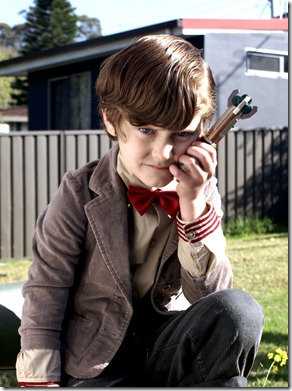
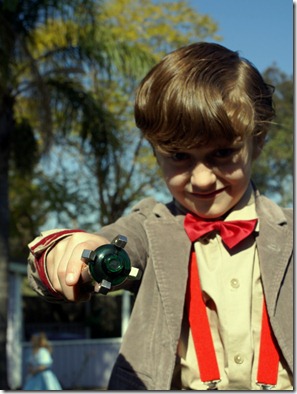
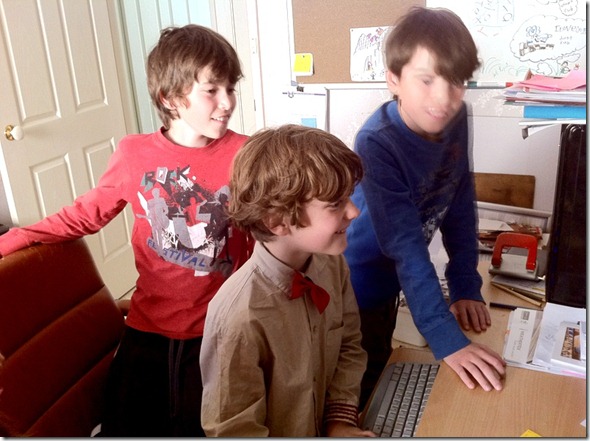
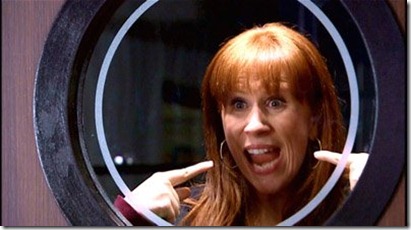
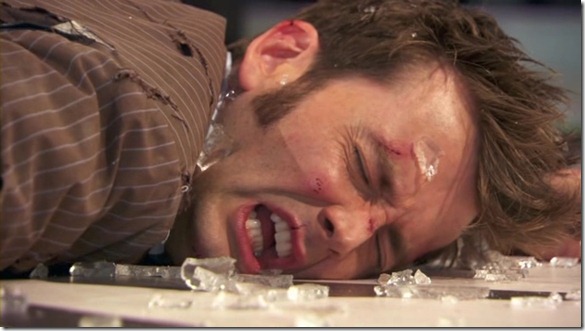
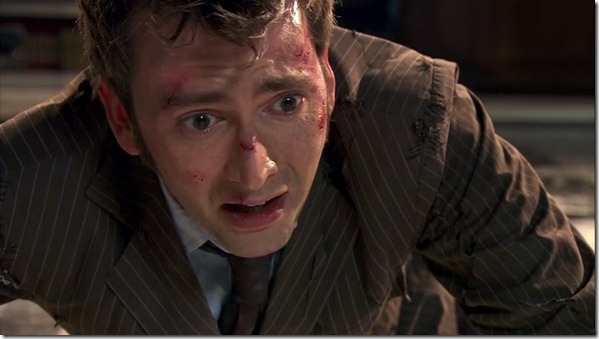
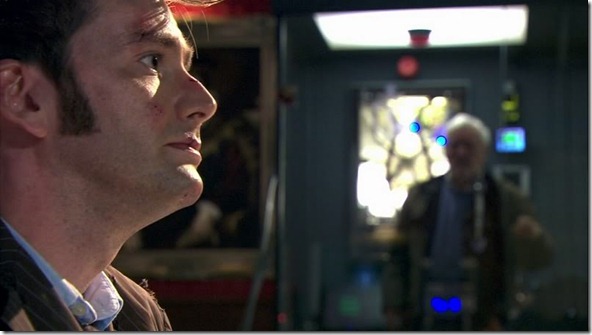
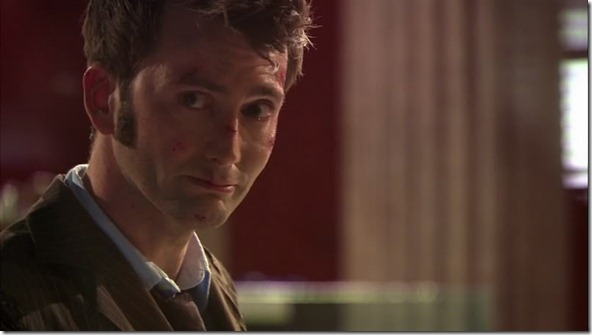
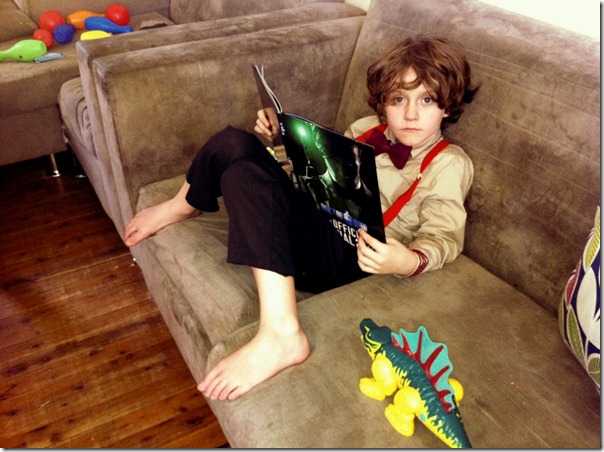

You’re back! We’ve missed you! ASD is such a complex world…
You might like some of the pure historical episodes from Classic Who.
Traci I would love to know of the classic Who episodes that focus on a historical topic. I can’t remember much of those series because I was little and the only time I watched them was when my older brother trapped me in his room and made me, I’m sure they were scarier back then :-)If you, or anyone else reading this, know of any you think would be good to watch can you please leave a comment here or email me.
Oh, there are some really good ones early on. The Azetcs with William Hartnell, Black Orchid with Peter Davison, The Romans, The Crusades, The Gunfighters, The Massacre of St. Bartholomew’s Eve, The Reign of Terror. My favorite one is Marco Polo, but it doesn’t exist any longer. The BBC wiped the tapes of a lot of early episodes. It has been restored as a narrated slide show kind of thing, and it’s still such a strong story that I love it. DailyMotion user Tardis Media has a lot of the classic series up. Just google search by the episode name.
Check out Netflix they have the old black and white episodes.
This was really inspiring and amazing to read…it’s made me realize why I enjoy DW so much myself, and that’s because of the sheer volume of -emotion- this show has. I enjoy many awesome shows about all sorts of stuff, but despite some bad writing and plot holes, DW holds it up with so much great emotion…the most prominent of which is usually enthusiasm and curiosity. I’m glad it’s working out so well for your son!
I am going to be a teacher, and I have a special place in my heart for children with Autism. I am also a fan of Doctor Who. This is one of the most beautiful things I have ever read. All I can really think to say is this: Parenting, you’re doing it right. What a fantastic thing you have done to engage your child in so many aspects of education, and life in general. I hope to someday be given the opportunity to do the same for my students. You are someone that I can truly say I admire.
Wow thank you for such a lovely comment, I’m going to try and remember all your positive thoughts when the inevitable rough days pop up.
Bravo! It warms my heart to see Doctor Who being used to teach valuable life lessons to an autist. 🙂 Just another proof of the brilliance of the Doctor!
This is brilliant. I have never thought of connecting with an autistic child this way before and it’s so beautiful to see his interest in Doctor Who doing so much more than entertaining him. This is such a wonderful story. Your son is incredibly bright and I am oodly excited (hehehehehe) to see him grow up with such a mastery of reading emotion.
Thank you so much for sharing!
My husband and I believe our son may be somewhere in the autism spectrum (we have an appointment for his evaluation soon). We are also avid Who watchers and have already said DS will grow up watching as well.
Thank you for this article. It just shows me one more reason it will be a great show for him to watch as he’s learning. 🙂
I wish you all the best on your journey of discovery with your son Kelsey. Remember that when or if he is given a label no two ASD kids are the same and you still know him better than any professional. You will be the one to figure out what makes your kid tic and how to use that as a tool for his future.
What an amazing look at your son’s special interest! Thank you so much. Doctor who is so awesome but I never could have imagined it’d be even more awesome then I once realized! I’ll have to watch again (time 3 or 4 though from Doc 9 all the way through)and point all those cool things out to my kids!
Amazing. I am so happy to see this. A dear friend of mine sent me the link to your blog (he’s also a big fan of Dr. Who). I LOVE how in depth you were describing emotion on the actors faces, and explaining the shouting and excitement. Brilliant. Your son is beautiful. 🙂
Thanks Carrie, I love what you write, so much information, I think I’m going to pop back through a few of your older posts.
As the Doctor Who universe supplies ample opportunity for tears of both kinds, your article brought tears to my eyes. Children with special needs, teach their families and care-givers lessons that are available through no other source. You have a special ability to learn and teach in this complex world. Thank you for teaching some of this wisdom to the rest of us with this well written article. The concepts, writing, and acting of Dr. Who also involves great skill at all levels in making complicated things real and understandable to us all….except for the wibbly-wobbly,timey-wimey parts. The all of a sudden Ood will now be a part of my families vocabulary.
Reading this was such a wonderful experience, and how you have taken something myself, my children, and my father hold so dear and brought it to a whole new level.
I never realized what a great teaching tool is and how in the past I’ve used it as well just not so in depth. What you have done is amazing. The way you described emotions was fantastic and as a parent I thank you for adding more ideas to teach. Thank you for letting us into your world this way and props to a great little Whovian Eli for picking such a great thing to be interested in Dr. Who.
You are amazing! I love Dr. Who but would not have thought of using it as a teaching tool. Your general methods here though are the same kind I am planning to use with our little girl. I just love that seeing Vincent and the Doctor helped your little man get past his paint phobia even if only temporarily–that is truly inspiring. I am going to recommend this article to everyone I know who teaches because I think the ideas are good for every kid, not just kids with ASD.
i love this article, i love the doctor and my 6yo aspie daughter does as well. thank you!
Loved this article. I have a 15 yr old autistic grandson who until that glorious day when Dr who reappeared on our screen was very hard to relate to or engage with. It was very hard to even get a word out of him. But Dr Who has given us a connection, as were both absolutely hooked. Were also both real sci fi geeks. Ok, so sometimes its the only thing we talk about but it often leads to other conversations. Thanks to Dr who 4 giving me my grandson back! 🙂
Aww that made my heart smile, so glad you’ve found a way to connect with your grandson.
As an adult with ASD, and one who went through childhood undiagnosed, Doctor Who was and is my ‘special interest’ too. So I’ve enjoyed reading your account very much.
I see how the show has helped you explore things with your son, which is so good to see.
I’ll note that some of the things I learned from the show were that it’s ok to behave and think differently to most people (to a point), and to not necessarily react to things in the way that most people would (or expect).
Hi Duncan thanks for your comment. You are so right it’s not only OK to think differently I believe the world truly needs different thinkers. I remember reading an article once about an accident where two men with ASD were first on the scene. These men were able to assess the situation and implement the necessary first aid without baulking at the horrific scene in front of them. They credited their ASD with giving themselves the ability to work through their first aid knowledge methodically without being overwhelmed by emotion and the paramedics said they wish everyone they dealt with acted as professionally as they did. Just one example where someone reacting out of the norm was the best thing for everyone.
My ASD (almost) 7 year old is just coming out of his almost 4year obsession with Dr Who and I’ve long believed that the fascination for ASD children is that in a lot of ways, to people who don’t know he’s Gallifreyan, the Dr is very much an autistic personality.
My 5 year old asd son has been all about doctor who for nearly 2 years, he loves it so much although his school isn’t happy with it as when he gets stressed he talks non stop about it. At home we are so used to it and it is brilliant watching him act it out
Yeah very true, wouldn’t it be cool if everyone thought of the Doctor when autism came up and not some of the negative stereotypes we get.
The Doctor in my son’s words “is too cool for school anyway” lol. i think it is a fantastic show to disappear into when you just need your own time and space
As a huge Dr Who fan and someone “on the autistic spectrum”, I can appreciate how puzzling, frustrating and sometimes stonewalling the world is.. And I think it’s wonderful that Eli has such an anchor, and loving Mum who ran with it.
Your article is beautiful, and I admit I am now slightly damp around the eyes. 😉
My boyfriend grew up with the 2nd Doctor onwards and I will ask him to post some of the older “historical” episodes he can remember for you. Dr Who is very personal to both of us, we even visited the 2 museums (now sadly one), I’ll remember those days forever. 🙂
You don’t know us, and I understand if you don’t need it, but if there’s anything toy, book or product wise you’re having trouble getting for Eli, I would be happy to middle-man for you from the UK.
Do you have “Dr Who Adventures”? It’s a (tenuously) educational activity magasine for kids, with themed free gifts and cast interviews, diaries, etc. If you don’t, we could post you some now and then if you’d like.
Hope my phone doesn’t eat this when I press send.
Found my post from last year that may interest you.
Time lord or Autistic?
http://craftysoul.posterous.com/timelord-or-autistic
I have a cousin nearing his pre-teens that struggles with autism and as a whovian I can totally see him getting into it. Thanks for the suggestion!
You are amazing and your son is amazing! But you probably already know that. 🙂 Whooo! Doctor Who!
I think you are a super parent for creating the links between the Doctor Who content and educational goals. Good job. This made my day.
I really enjoyed reading this. Sounds like you’re ding a great job there. Thanks for writing about it.
Fascinating and inspiring! Thanks for sharing this, Sarah.
I would just like to say, having worked with autistic students [I’m primarily a teacher of English, Media and Drama, though now teach the whole caboodle!] and being a huge fan of Dr Who as well, I think you’ve done amazingly well to get so much out of potentially very little material.
Might I point you to sites like ilovefilm which has most of the current run online [much cheaper than hiring dvds – also you can then rewatch whenever you like?]
As someone else has mentioned earlier, should you need anything from the UK, please don’t hesitate in contacting me – living in London helps!
Hope you enjoy the future episodes coming – might I finally suggest sending Stephen Moffat an email – he loves stories like this and may even send a reply? Keep up the fantastic work -Allonsie!-
This made my day! Good for you for hopping on board the Tardis with Dr. Who and your son. Sounds like a grand adventure for you both!
Great post, thanks! Have you also watched the spin off Sarah Jane Adventures? The doctor (10/11)makes a couple of appearances. My autistic daughter loves the series and the audiobooks. She loves Luke and Sky who have to learn social rules, a bit like data in star trek.
She also likes some of the classic series episodes with Sarah Jane in them.
Another Aspie Whovian here. Awesome the show’s been helping your son.
Maybe in a few years (since it does have some bloody violence and sexual content), you might want to introduce him to Sherlock, from many of the same writers who work on Doctor Who. Similar cleverness in a realistic setting and Sherlock is almost certainly on the spectrum (though he identifies himself as a “high-functioning sociopath”, he has too much emotional empathy for that label to fit and he probably only identifies that way because given his line of work he’d rather be feared as a sociopath than pitied as autistic).
I am so glad a friend shared this site…our 15 year old grandson is high functioning autistic and with proper diet he now does pretty well on a daily basis…we are all huge sci-fi fans and Dr Who is a favorite…it had never occurred to me just what a marvelous learning tool he could be… thanks so much for sharing this with us…I wish you all the very best (I know I will be watching the doctor with a whole new appreciation from now on)
This so cool – mostly because I have a 9 year old son Aspergers son, who ALSO lives for Doctor Who. We homeschool, and our Doctor & Rose action figures frequently drop in and help with History. We also have Dr. Who art classes (thanks to Van Gogh). And my son who HATES music/singing of any kind takes “ood class” where he learns to sing & play/read music. Apparently it okay if it Ood class. My son also hates gym class but loves running away from cybermen and daleks at the playground, and we often set up obstacle courses for our little doctor.
Too bad we live too far away for a playdate – they’d have a blast together!
Eli could BE a little Matt Smith, that first photo is sooo adorable you could just eat him up!
I used your story to explain to my older son the name for what his younger son lives with. Interestingly, I described the characteristics of Aspergers, he first thought I was talking about the Doctor himself.
As a Whovian, and mother to a 5.5 year old who is likely on the spectrum, I am sitting here bawling my eyes out. Thank you for sharing. I watch The Doctor all the time, and he is aware of the concept of the show, but at this age, not quite ready to sit through it. I can’t wait. 😀 You inspired me to look at other things to use as ways to teach him about our complex emotions, and social cues. Thank you.
This. Is. Awesome. I love Dr. Who but how you’ve just jumped in with this and your son, inspirational. I am a first time visitor to your blog, but I will be back for sure. You remind me that I need to dive in more to my son’s obsessions. There are lessons to be learned. And maybe he needs to start watching Dr. Who. 🙂 Thank you for sharing!!
Oh girl, my son also has autism…I swear you just described our life. He loves Doctor Who, I think my favorite is when he expresses to people his love of various items as “It’s a … I wear/love/want a … now. …. are cool.”
His wanting to exterminate everything bothers me, though. He really loves those Daleks.
Thank you so much, this just made my day.
This is brilliant. My 9 Year old son has ASD and is obsessed with Doctor Who and I have also done the same, I have dived straight into it with him. One of the main things I do with my son when were out and his not too sure about the place, i let him scan the area with his sonic screwdriver, after 15 minutes he feels better about it. i had a major break through in march, my son has never wanted a birthday party, but when i said shell we do a doctor who party and turn the house in to a tardis, he finally agreed. After three weeks of painting the tardis walls, getting friends to help paint the aliens he had the best party a little boy with autism could have.
i found this website about a researcher writing a book about the link between autism and doctor who http://www.doctorwhonews.net/2010/03/dwn260311170014-autism-project-calls.html
does any one know if it has been published yet.
Hannah, that idea is awesome…using the sonic screwdriver to scan the place. I worry that my boy will also use it to scan people (which, if you think about it, might not be a bad idea, haha.)
Thanks for the input!!
I wish I’d had a parent like you 🙂 I have a ASD/ADHD and my childhood and most of my adolescence through the end of high school was pure hell. I’ve spent my whole life trying to figure out the ‘rules’ in order to understand other people’s emotions.
I finally found such a book that spelled out those rules but it’s a bit over Eli’s level called “What Every Body is Saying”.
Oh.. and I love Doctor Who too 🙂
Tremendous example of creativity and innovation. How inspiring was your story? I am going to begin watching Dr. Who to see how my kids like it. Please continue to teach us with your incredible example. Thank you and your family for the inspiration of turning things we enjoy into learning tools.
i am unable to get in touch by email (your form is broken and is not reading the captcha correctly), but have a doctor who-related suggestion that may be of assistance to you and your son. no, i will not benefit from it financially, but i would prefer to not share it in public. feel free to shoot me an email from a throw-away address if you wish.
I found your blog because I’m participating in the “Autistic people should…” flash blog and search engine activism event.
One of my activist friends noticed if she typed “Autistic people” into various search engines, the autocompletion (based on popular searches) was awful stuff such as “autistic people should die”. So the community decided to blog about good things “autistic people should…” do or have or whatever AND type those types of searches into various engines.
After a bunch of typical activist stuff like “autistic people should have civil rights,” “autistic people should be happy” etc. I got bored and typed “autistic people should like Doctor Who” because I’m autistic and just finished watching Season 5 again with the gloriously eccentric 11th Doctor.
So this blog was the first Google hit, and I just had to read it. I think you’re one of the best moms ever, for leveraging his special interest to use a well-written piece of fiction to learn life lessons. If only my mother had done the same thing instead of griping about what a stupid show it was (back when Tom Baker was the 4th Doctor and it was on PBS instead of cable).
And your son makes an adorable 11th Doctor! Squee!!!
I’ve had a story kicking around in my brain for a while, when I’m driving or doing housework or procrastinating: the autistic artist auntie of two autistic kids bonds with her niece and nephew via their shared interest in Doctor Who and overcome their mother’s insistence on appearing “normal.”
Thank you for showing how interests can help in educating ASD children. ive got 2 ASD munchkins and 1 mildly intectually disabled child and We use their interests to help educating them.
I just started tutoring 12 year old twins with autism. They are big fans of Doctor Who. Their speech problems have made learning to read phonetically a challenge so we’re trying to teach them sight words. Any suggestions you’ve tried or have heard about would really be appreciated!
I am a 16 year old student. I am recently conducting a research paper on how Doctor Who has affected our society and lives. Thank you so much for posting this. It has bean a big help. I am deeply great full.
I came across your awesome post. I have a 5 year old boy who I think might really enjoy Doctor Who. Are there any books? Where do we begin? How to I get him started? Thanks!
I, too have a Autism Spectrum child, and she has been through several deep interests. Harry Potter, Star Trek, and for the past 3 years, Doctor Who. It’s neat to see that others have had similar experience. She is much older than your child (currently 17) and has now seen all the episodes there are to see. Yes, all 50 years, and has listened to most of the “missing” episodes. She is at a bit of a loss right now since there are no new episodes to be broadcast any time soon!! Aargh.
Oh, and as a librarian, I teamed up with our YA librarian and did a month-long series of Doctor Who events, leading up to the 50th Anniversary special on Nov.23. We had costumes, and crafts, and tardis cake, and a Whovian scavenger hunt in the library after hours. It was awesome. And I was looking at the crowd and thinking, “hmm, I wonder how many of the people here are or were on the Spectrum.” We had an age range from about 5 years old to 67 at our final 12 hour event.
—Dancing Librarian